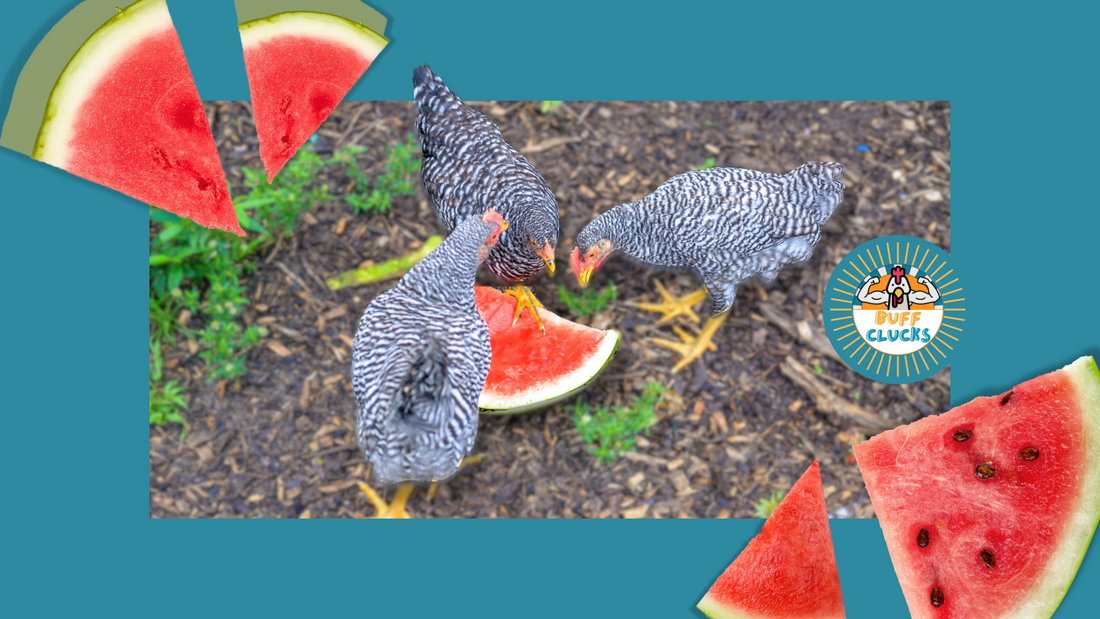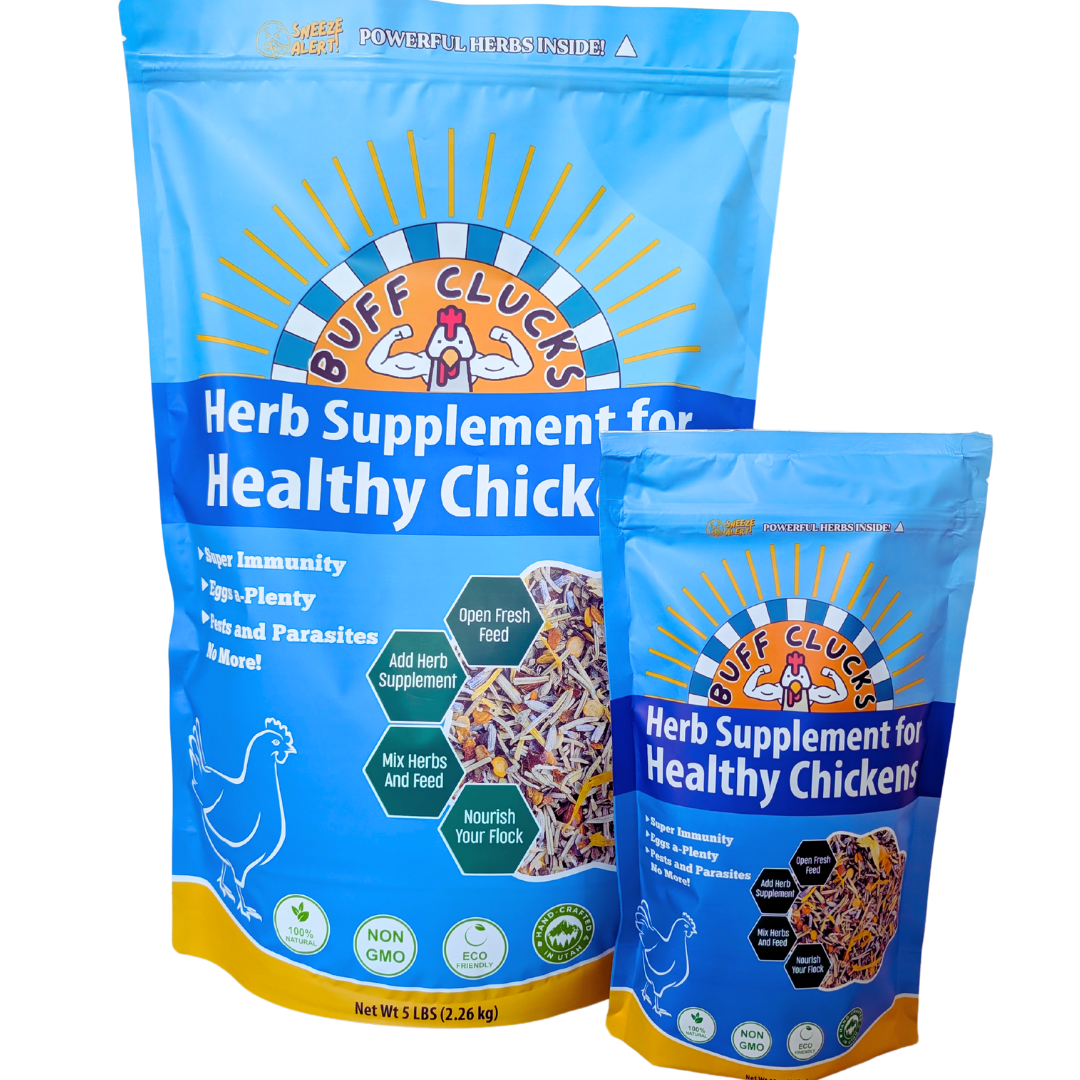
Can Chickens Eat Watermelon?
Watermelon is a favorite summer treat for many of us, and if you're a backyard chicken owner, you might be wondering if your chickens can eat watermelon, too!
The answer is a resounding Cluck, Yes!
Chickens can eat watermelon. Not only is it safe for them to eat, but it also provides a variety of nutritional benefits that can contribute to the overall health of your flock. Let's dive into the details of why chickens eat watermelon and how it can benefit them.
Nutritional Value of Watermelon for Chickens
Chickens eat watermelon because it's a juicy, delicious treat. But it's also packed with nutrients that can help keep your chickens healthy. Here are some of the key nutrients found in watermelon:
- Vitamins: Watermelon is rich in vitamins A, B6, and C, all of which are essential for maintaining a healthy immune system and promoting overall health.
- Minerals: This fruit contains important minerals such as potassium and magnesium, which play crucial roles in muscle function and hydration.
- Antioxidants: Watermelon is a great source of antioxidants, including lycopene and beta-carotene, which help protect cells from damage and support eye health.
- Hydration: Made up of about 92% water, watermelon is excellent for keeping your chickens hydrated, especially during hot summer days.

Vitamin A
Vitamin A is vital for maintaining healthy vision, skin, and immune function in chickens. It helps prevent issues such as poor feather quality and respiratory infections. When chickens eat watermelon, they get a good dose of this essential vitamin.
Vitamin B6
Vitamin B6 is important for protein metabolism and the production of neurotransmitters in chickens. It supports brain function and helps maintain healthy growth and development.
Vitamin C
While chickens can synthesize their own vitamin C, providing additional sources through their diet can boost their overall health, especially during times of stress. Vitamin C acts as an antioxidant and supports the immune system.
Potassium
Potassium is crucial for maintaining proper muscle function and electrolyte balance in chickens. It helps prevent muscle cramps and supports cardiovascular health.
Magnesium
Magnesium plays a role in many biochemical reactions in the body, including energy production and protein synthesis. It is also important for maintaining healthy bones and muscles.
Antioxidants
Antioxidants like lycopene and beta-carotene help protect chickens' cells from oxidative damage. Lycopene, in particular, has been shown to reduce the risk of certain types of cancer and support heart health.
Benefits of Chickens Eating Watermelon
Feeding watermelon to your chickens can provide numerous benefits. Here are some of the key advantages:
- Hydration: With its high water content, watermelon is an excellent way to keep your chickens hydrated, especially during hot weather.
- Improved Digestion: The fiber in watermelon aids in digestion and helps maintain a healthy gut.
- Enhanced Immune System: The vitamins and antioxidants in watermelon support a strong immune system, helping chickens fight off diseases and infections.
- Increased Energy: Watermelon provides a natural source of sugars that can give your chickens a quick energy boost.
- Overall Health: The combination of vitamins, minerals, and antioxidants in watermelon contributes to the overall well-being of your flock.
How to Safely Feed Watermelon to Chickens
While chickens eat watermelon and generally enjoy it, there are a few guidelines to follow to ensure they can enjoy it without any issues.
Preparing the Watermelon
- Wash the Watermelon: Before giving watermelon to your chickens, make sure to wash the rind thoroughly to remove any dirt or pesticides.
- Cut into Manageable Pieces: Cut the watermelon into small, manageable pieces that your chickens can easily peck at. This will help prevent choking and make it easier for them to eat.
- Remove Seeds: Although watermelon seeds are not toxic to chickens, it's a good idea to remove them to avoid any potential choking hazards.
Serving Suggestions for Chickens Eating Watermelon
- Offer in Moderation: While watermelon is healthy, it should be given as a treat and not as a substitute for their regular feed. Too much watermelon can lead to digestive upset due to its high water and sugar content.
- Mix with Other Fruits: For added variety and nutrition, you can mix watermelon with other fruits like berries, apples, or bananas.
- Use the Rind: Chickens can also eat the rind, but it should be cut into small pieces. The rind contains fiber and additional nutrients, making it a great part of the treat.
Buff Clucks Popsicles: Keeping Chickens Cool This Summer

Recipe for Buff Clucks Popsicles
Why not combine the hydrating power of watermelon with the nutritional benefits of the Buff Clucks Herb Supplement? This simple and delicious recipe for Buff Clucks Popsicles is perfect for keeping your chickens cool and healthy on hot summer days.
Ingredients:
- Watermelon (and any other fruits your chickens enjoy)
- Buff Clucks Herb Supplement
Instructions:
- Blend the Fruit: Cut the watermelon and any additional fruits into small pieces and blend them in a high-powered blender until smooth.
- Pour into Ice Tray: Pour the blended fruit mixture into an ice tray.
- Sprinkle with Herbs: Sprinkle a small amount of Buff Clucks Herb Supplement over each section of the ice tray.
- Freeze: Place the ice tray in the freezer and let it freeze completely.
- Serve: Once frozen, pop out the Buff Clucks Popsicles and serve them to your chickens on a hot day.
Combined Benefits of Buff Clucks Herb Supplement and Watermelon
When chickens eat watermelon combined with the Buff Clucks Herb Supplement, they receive a powerhouse of nutrients and benefits.
- Hydration: The high water content in watermelon keeps chickens hydrated, which is crucial during the summer heat.
- Nutritional Boost: The vitamins and minerals in watermelon, such as vitamins A, B6, C, potassium, and magnesium, enhance the overall health of your chickens.
- Immune Support: The Buff Clucks Herb Supplement is packed with natural herbs that support the immune system, improve digestion, and repel parasites.
- Enhanced Flavor and Nutrition: The combination of watermelon and Buff Clucks herbs makes for a tasty treat that chickens will love, ensuring they get their essential nutrients in a fun and engaging way.

Frequently Asked Questions
Can Baby Chickens Eat Watermelon?
Yes, baby chickens can eat watermelon, but it should be given in smaller amounts and pieces. Make sure the pieces are appropriately sized.
Can Watermelon Cause Health Issues in Chickens?
In moderation, watermelon is safe and healthy for chickens. However, overfeeding can lead to diarrhea due to its high water content. It's important to balance their diet with other nutritious foods and ensure they have access to their regular feed.
How Often Should Chickens Eat Watermelon?
Chickens can eat watermelon as an occasional treat, not more than once or twice a week. This ensures they get the benefits without any negative effects on their digestion or overall diet.
Let Your Chickens Eat Watermelon....It's Good For Them!
Adding watermelon to your chickens' diet can be a delightful and nutritious treat. Its rich nutritional profile, combined with its high water content, makes it an excellent choice for keeping your flock healthy and hydrated.
Remember to feed it in moderation and prepare it properly to ensure your chickens can safely enjoy this refreshing fruit. By doing so, you'll be contributing to their overall well-being and happiness, especially during those hot summer days. So go ahead and share some watermelon with your feathered friends, they'll love it!

























